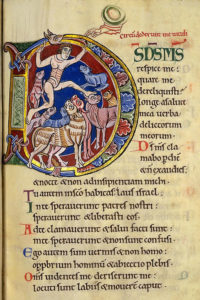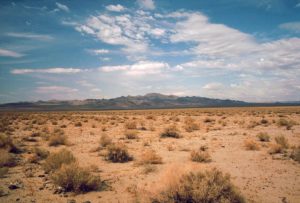The Old Testament Book of Psalms (the Psalter) is a hymn book that was finalized between 500 – 390 BCE. The Psalms are a collection of religious poems of Israel that were used during liturgical ceremonies originally in the Temple in Jerusalem and in Jewish synagogues. Thousands of psalms were written but only 150 found their way into the Psalter. The Psalms represent the work of numerous poets; 83 of these poems bear King David’s name.
 The Psalms describe God as the Holy One who dwells in the fullness of life and power. In Psalm 99, verse 8, for example, the poet declares: “Extol the Lord our God and bow in worship before God’s holy mountain, for the Lord our God is Holy.” The Psalms also depict God as the Eternal One. Psalm 90, verse 2, states: “Before the mountains were created or You had formed the earth and its surface, from eternity to eternity You are God.” God who is eternal is a refuge in times of need.. In Psalm 91, verses 1 and 2, we read: “You who dwell in the shelter of God most High, abide in the shadow of the Almighty, say to the Lord, my refuge, my fortress in whom I trust.” Additionally, the Psalter claims God as redeemer. In Psalm 31, verses 2 – 5, the poet prays: “Into your hands I commend my spirit, You who have redeemed me, Lord, faithful God.”
The Psalms describe God as the Holy One who dwells in the fullness of life and power. In Psalm 99, verse 8, for example, the poet declares: “Extol the Lord our God and bow in worship before God’s holy mountain, for the Lord our God is Holy.” The Psalms also depict God as the Eternal One. Psalm 90, verse 2, states: “Before the mountains were created or You had formed the earth and its surface, from eternity to eternity You are God.” God who is eternal is a refuge in times of need.. In Psalm 91, verses 1 and 2, we read: “You who dwell in the shelter of God most High, abide in the shadow of the Almighty, say to the Lord, my refuge, my fortress in whom I trust.” Additionally, the Psalter claims God as redeemer. In Psalm 31, verses 2 – 5, the poet prays: “Into your hands I commend my spirit, You who have redeemed me, Lord, faithful God.”
As a Cistercian monk, Thomas Merton chanted his way through the entire Psalter every week of the year. Merton prayed the Psalms so frequently that their words took up residence in his heart and resounded in his being. The Psalms were Merton’s daily spiritual sustenance. They were bread for his pilgrimage through life.
Merton wrote several books about the Psalms: Praying the Psalms and Bread in the Wilderness. In these texts, Merton contends that the Psalms are perhaps the most significant and influential religious collection of poems ever written. He notes that the Psalms encompass various facets of the human experience of the Divine, including: delight in God’s Law and peace in God’s will (Psalm 1); confidence in God (Psalms 119 – 133); mystical joy (Psalm 41); sorrow for offending God (Psalm 129); and joyful praise and adoration of God (Psalm 117).
When praying the Psalms, one raises one’s mind and heart to God and brings the substance of his or her life to the experience. Merton notes: “We bring to the Psalms the raw material of our poor, isolated persons, with our own individual conflicts, sufferings and trials.”[i] Merton recommends that one read or recite the Psalms slowly, savoring them, meditating on their meaning, and allowing their life lessons to penetrate one’s being. Additionally, Merton reflects that “There is … no kind of religious experience, no spiritual need of a person that is not depicted and lived out in the Psalms.”[ii] Merton adds that “God will give Godself to us through the Psalter if we give ourselves to God without reserve in our recitation of the Psalms.”[iii]
The Psalter is canticum novum, the song of those reborn as new creation. Those who pray these poems glorify God. The Psalms build a bridge between earth and heaven, for, as Merton declares: “To chant the Psalms … is to join in the Liturgy of heaven. It is to praise God with something of the same love with which God is praised by the blessed spirits.” [iv] who are enjoying life in eternity with God who is Love.
Sr. Marilyn Sunderman, RSM, Ph.D., is professor of theology and chair of the on-campus undergraduate theology program at Saint Joseph’s College.
[i] Thomas Merton, Bread in the Wilderness (New York: New Directions, 2014) 118.
[ii] Thomas Merton, Praying the Psalms (Collegeville, MN: The Liturgical Press, 1956) 44.
[iii] Merton, Bread in the Wilderness, 64.
[iv] Merton, Bread in the Wilderness, 136.

